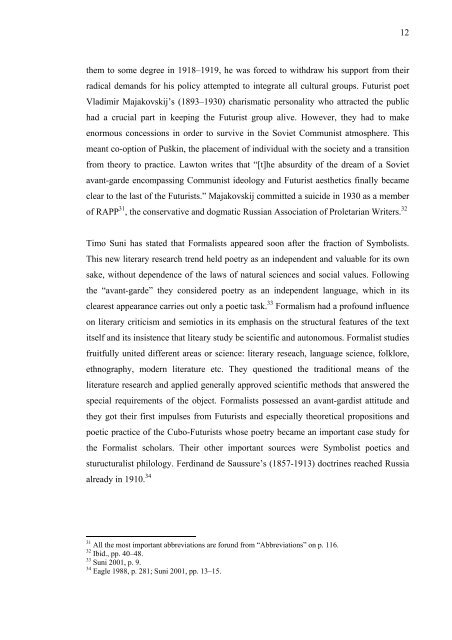Boris Asaf'ev and the Soviet Musicology - E-thesis
Boris Asaf'ev and the Soviet Musicology - E-thesis
Boris Asaf'ev and the Soviet Musicology - E-thesis
Create successful ePaper yourself
Turn your PDF publications into a flip-book with our unique Google optimized e-Paper software.
<strong>the</strong>m to some degree in 1918–1919, he was forced to withdraw his support from <strong>the</strong>ir<br />
radical dem<strong>and</strong>s for his policy attempted to integrate all cultural groups. Futurist poet<br />
Vladimir Majakovskij’s (1893–1930) charismatic personality who attracted <strong>the</strong> public<br />
had a crucial part in keeping <strong>the</strong> Futurist group alive. However, <strong>the</strong>y had to make<br />
enormous concessions in order to survive in <strong>the</strong> <strong>Soviet</strong> Communist atmosphere. This<br />
meant co-option of Puškin, <strong>the</strong> placement of individual with <strong>the</strong> society <strong>and</strong> a transition<br />
from <strong>the</strong>ory to practice. Lawton writes that “[t]he absurdity of <strong>the</strong> dream of a <strong>Soviet</strong><br />
avant-garde encompassing Communist ideology <strong>and</strong> Futurist aes<strong>the</strong>tics finally became<br />
clear to <strong>the</strong> last of <strong>the</strong> Futurists.” Majakovskij committed a suicide in 1930 as a member<br />
of RAPP 31 , <strong>the</strong> conservative <strong>and</strong> dogmatic Russian Association of Proletarian Writers. 32<br />
Timo Suni has stated that Formalists appeared soon after <strong>the</strong> fraction of Symbolists.<br />
This new literary research trend held poetry as an independent <strong>and</strong> valuable for its own<br />
sake, without dependence of <strong>the</strong> laws of natural sciences <strong>and</strong> social values. Following<br />
<strong>the</strong> “avant-garde” <strong>the</strong>y considered poetry as an independent language, which in its<br />
clearest appearance carries out only a poetic task. 33 Formalism had a profound influence<br />
on literary criticism <strong>and</strong> semiotics in its emphasis on <strong>the</strong> structural features of <strong>the</strong> text<br />
itself <strong>and</strong> its insistence that liteary study be scientific <strong>and</strong> autonomous. Formalist studies<br />
fruitfully united different areas or science: literary reseach, language science, folklore,<br />
ethnography, modern literature etc. They questioned <strong>the</strong> traditional means of <strong>the</strong><br />
literature research <strong>and</strong> applied generally approved scientific methods that answered <strong>the</strong><br />
special requirements of <strong>the</strong> object. Formalists possessed an avant-gardist attitude <strong>and</strong><br />
<strong>the</strong>y got <strong>the</strong>ir first impulses from Futurists <strong>and</strong> especially <strong>the</strong>oretical propositions <strong>and</strong><br />
poetic practice of <strong>the</strong> Cubo-Futurists whose poetry became an important case study for<br />
<strong>the</strong> Formalist scholars. Their o<strong>the</strong>r important sources were Symbolist poetics <strong>and</strong><br />
sturucturalist philology. Ferdin<strong>and</strong> de Saussure’s (1857-1913) doctrines reached Russia<br />
already in 1910. 34<br />
31<br />
All <strong>the</strong> most important abbreviations are forund from “Abbreviations” on p. 116.<br />
32<br />
Ibid., pp. 40–48.<br />
33<br />
Suni 2001, p. 9.<br />
34<br />
Eagle 1988, p. 281; Suni 2001, pp. 13–15.<br />
12

















